Sovereign Citizens: Part One - Intro, Police and Councils
Katrina Borthwick - 31st March 2025
Buckle up for a deep dive on Sovereign Citizens and the law in New Zealand.
First up I will say I am not a lawyer, just an innocent bystander who is in awe of the patient and restrained responses of police, justices of the peace and judges in dealing with some of the convoluted weirdness coming in their direction from these people. I guess being unqualified, that makes me perfectly qualified to talk about pseudolaw? Perhaps not, but welcome to the ride anyway.
The first part of my series will refresh your mind on some of the beliefs sovereign citizens generally hold, and go into some of the grief this is causing with Police and Councils. In future parts I will be looking into the mischief created for our Justices of the Peace, and in our Courts.
A refresher on SovCits
Sovereign citizens aren’t a single group, or even that well organised, and they don’t all believe the same things. They also vary in how far they are willing to push the law. Some may have bumper stickers, some may try to get out of parking tickets, some may try to steal your house. It’s a really mixed bag, but there are some common elements that emerge.
The 2021 NZ Threat Insight Group summarised it well in describing them as:
A highly diverse, decentralised movement that claims that national governments are illegitimate and that individuals can legally withdraw their consent to be governed by national governments.
There are some really weird behaviours emerging from these people, and that is always interesting to talk about. But it becomes even more intriguing when you dig down into the reasons why they are doing it. The legal gibberish underpinning this has been called pseudolaw.
US Origins
The concept of a sovereign citizen has been imported from the US, and has been noticeable in New Zealand since roughly the early 2000s. However the idea took a big upswing in popularity following the Covid-19 pandemic.
I do want to focus on New Zealand, but it is useful to see where the concept has come from, if only to understand how irrelevant some of it is to our country - even if you were to believe the underlying rationale.
There’s a really handy quick guide from the UNC School Government that summarises the origins of the sovereign citizen ‘legal’ arguments in the US. But, essentially, what it boils down to is they believe there is an original sovereign class of citizen, and a second class of federal citizens created by the fourteenth amendment.
The Fourteenth Amendment to the US Constitution, ratified in 1868, addresses citizenship, equal protection under the law, and due process. Sovereign citizens have full rights under the constitution, but according to sovereign citizens, federal citizens have bargained away their rights by accepting benefits from the US government. In their opinion governments established in southern states of the US after the Civil War were imposed without consent, and are unlawful.
So sovereign citizens spend a lot of time ensuring they denounce federal citizenship and assert their sovereign citizenship. The refusal of IDs, licences and postcodes, and refusing to pay taxes, all come from this idea.
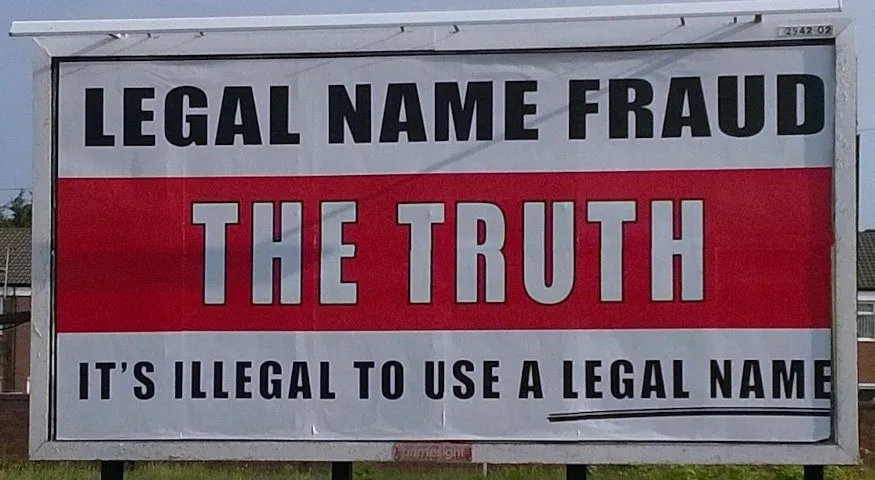
Added to this, the US Federal government gave up the gold standard in the 1930s. The sovereign citizen conspiracy theory is that instead of gold, the government substituted the future earnings of its own citizens as security against debts. They believe there is a projected amount of future earnings secretly tucked away in the US treasury for every federal citizen. This (somehow) creates two separate identities. The corporate shell account, or ‘strawman’, identity that has been put up as debt collateral, and the flesh and blood identity.
These two concepts, citizenship and fleshiness, are blurred together so often the words federal citizen, corporate shell identity, artificial person and strawman are used interchangeably. The same goes for the flesh and blood identity, real person or sovereign citizen. This is sometimes referred to as the ‘strawman duality’.
Oh yes, and of course there’s all that secret cash in the US Treasury with these citizens’ names on it. Naturally some have claimed the right to that cash, and from time to time issue ‘bonds’ from it as payment for debts.
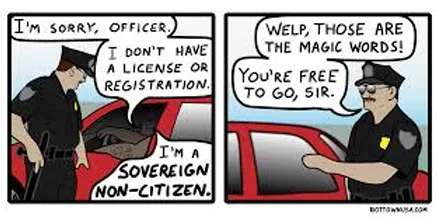
What do SovCits in New Zealand believe
This 2024 University of NSW paper does a great job of outlining some of the common ideas shared by sovereign citizens that we see in both Australia and New Zealand.
The strawman argument draws its life directly from the dualist argument above. Sovereign citizens claim that the law does not apply to them, because it applies only to ‘artificial’ persons who possess a separate legal personality – the strawmen are government enslaved.
Sovereign citizens believe that everything is a contract, and as sovereign citizens they are not bound by the laws of the country unless they waive those rights by accepting a contract with the government. They also believe that government authority is not lawful in the absence of individual consent, and they do not consent to the law operating upon them.
Add to this, they also believe that silence means agreement to any claim that they make. So, basically, they can create sworn documents claiming whatever they want, and if nobody rebuts it, then it has legal standing. They might call this an “affidavit of truth”.
They also hold that legal action requires an injured party, and that there is no crime if there is no injured party. This argument might be made for all sorts of things including speeding, drug abuse, public drunkenness, vagrancy, ‘consensual’ sex with minors… yes, it can get icky.
And, of course - stemming from its US origins - there is the belief that the law is inoperative ‘because the only valid currency is gold and silver coins’.
There are also implications for banking and taxation. For example, the idea that ‘capital gains tax is an unjust exaction forbidden by Magna Carta’ whenever it is proposed in New Zealand. We have also seen assertions that there is no need for sovereign citizens to pay their mortgage because the Magna Carta guarantees their rights ‘to their matrimonial home’.
The Magna Carta, signed by King John of England at Runnymede in 1215, is a historic document that established the principle that even a king is subject to the rule of law. It has no legal standing in New Zealand, and has been repealed long ago.
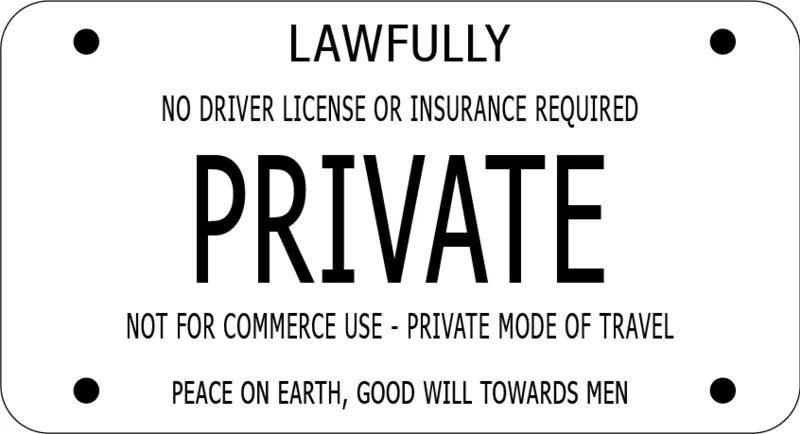
So, what’s the point?
Handily there is a helpful slide deck up on the internet from a joint presentation made by the Police and Tasman District Council to the ILANZ (In-House Lawyers Association) conference. This gives a window into some of the challenges being faced by the Police and Councils.
Some of the things they are seeing are Sovereign citizens attempting to do:
- annul their debts by renouncing citizenship
- escape criminal convictions/prison/traffic offences
- avoid the census
- avoid paying rates
- avoid getting (or paying for) building consents (example below)
There is also an increasing trend for them to weaponise the LGOIMA (the local government version of the Official Information Act) to make tonnes of information requests to local governments. This can tie up resources unnecessarily, and every one of these requests has to be checked to ensure there are no legitimate requests for information lost in the muddle.
In a recent case that was covered in the media, a couple in Raglan tried it on with unauthorised home renovations. They sent a document to the Council claiming a building consent had been granted by a person called “Piripi” of the Hapu Tangata Whenua Suveran Authority of Te Ika a Maui on February 16, 2021. They refused to meet with the Council unless they were paid. It didn’t work, and they were fined $20,000. After ongoing palaver the whole thing ended up in Court. The letter containing their demand for payment was entitled “Notice to one is notice to all”, and is described by the judge as follows:
It contains purported assertions of legal authority, which are somewhat spurious, and an invitation to pay a substantial amount of money to them to attend an interview
- Judge Crayton
I feel the restraint the judge exercised in writing that sentence IN MY BONES. As it happens, they didn’t turn up for sentencing, so this is still pending.
In another example, a sovereign citizen attempted to seize someone’s home. Former Nelson mayor Rachel Reese came home to find a stranger in her house. He launched himself at her, yelling “why are you in my house, this is my house – it’s been decreed this is my house”. He was citing the Magna Carta. In the US, Sovereign citizens tend to believe in squatters’ rights, and have been known to move into abandoned houses, fix them up, connect services, then file documents they believe confirm their new ownership of the property.
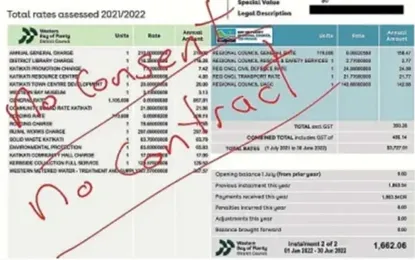
Councils and Police
So, how do the Council and Police spot a sovereign citizen? Well, here are some red flags which start to make more ‘sense’ once you understand the overriding beliefs I have already described.
Things to look out for are statements such as ‘the government is a corporation’, ‘no consent, no contract’, references to Admiralty/Maritime law, and references to ‘strawman’ or ‘strawman funds’.
As an aside, the reference to Maritime law is another misinterpretation of the US Constitution. Article III basically establishes two courts - federal and admiralty. A ‘sovereign’ in maritime law is a vessel or person that is not a part of any nation, and does not have any protection from any nation. So basically just another attempt to dodge federal citizenship and be ‘separate to’.
Another common sign someone may have sovereign citizenship beliefs is they have weird ways of referring to themselves or writing their name. For example the lower case katrina-borthwick@ may refer to the flesh-and-blood person, whereas the capitalised version KATRINA BORTHWICK refers to the corporate shell of a person. Or sometimes it’s the other way around. It is common to see punctuation or other symbols added to their name to signify they are referring to the real person. They may also refer to themselves as ‘Non-resident Settlors” or “Living man/woman”.
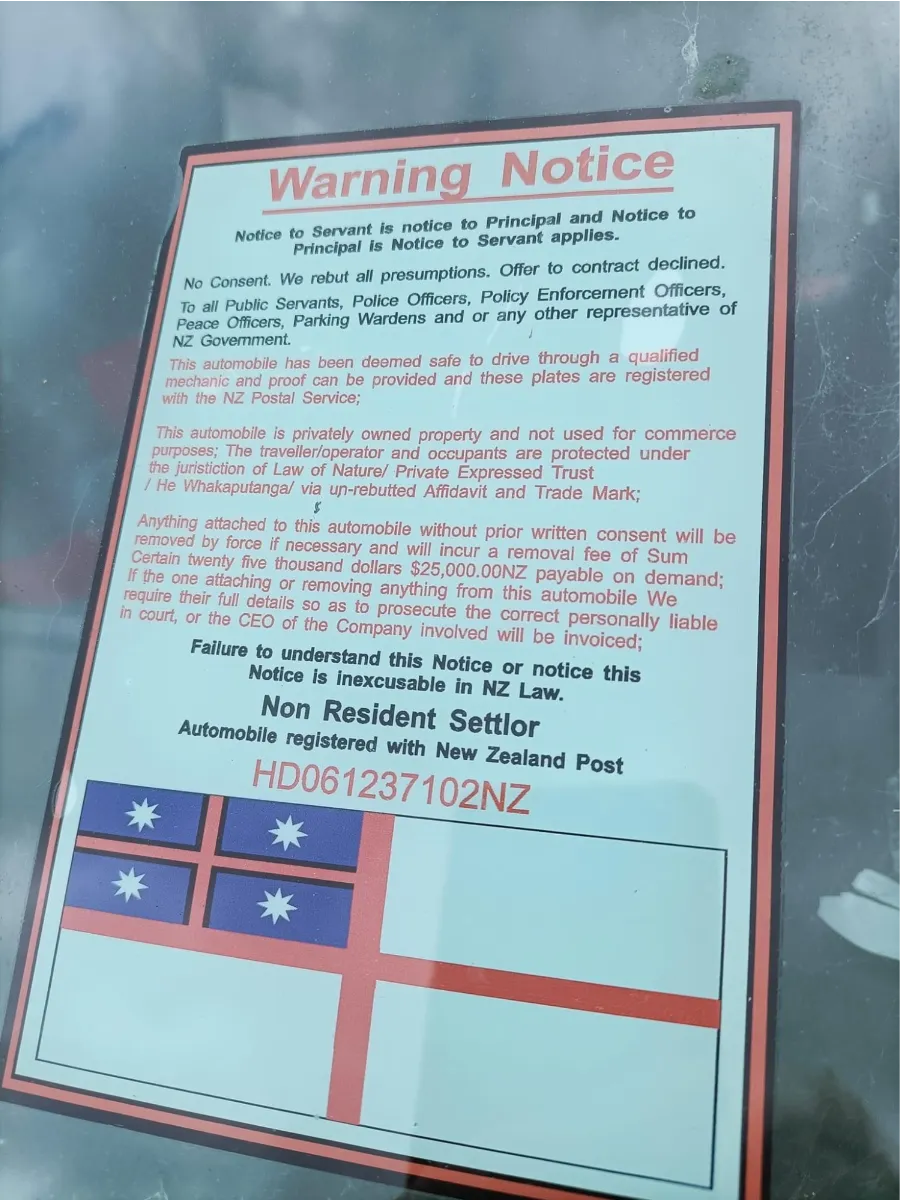
If they are producing documentation, it might look a bit unusual. For example, documents that are unnecessarily notarised in some way, even when this is not required. They might sign with red ink, with a thumb print or over the top of a stamp. This may be a reference to gold - US bonds in some states are cancelled in red ink. Sovereign citizens therefore sign many legal documents and correspondence in red ink to signify that they are cancelling the bond attached to their birth certificate or corporate shell self. Others simply believe the colour of the ink represents the blood of the flesh-and-blood person.
Another one to watch for is the postcode may say “near” as part of the address, to avoid accepting the ‘contract’ of having a postcode.
And, of course, no weirdo document would be complete without pseudolegal jargon like “Notice of Default”, “Notice to agent is notice to principal, notice to principal is notice to agent”, “All beneficial rights reserved in equity”. These are meaningless in the context they are used, but might sound a bit scary or legal to some. They are of particular concern when they are accompanied by a threat, for example to seize property or arrest someone. Not something most people would want in their mailbox.
Another common thing noted in New Zealand are claims of ‘allodial title’ to public property. In the context of property law, an ‘allodial title’ refers to ownership of real property that is independent of any superior landlord, meaning the owner has absolute and complete control, free from any service or acknowledgment to a higher authority. Allodial titles are not recognised under New Zealand property law. About the closest we get is ‘fee simple’ freehold ownership of a property.
So what trouble are they causing for Police and Councils
Police in New Zealand have seen all sorts of carry-on from sovereign citizens, including:
- Behaviours at the Parliament Occupation – for example beliefs that the Police have no powers of arrest, and refusing to give details when arrested;
- The Occupation of houses and parks (allodial title);
- Bogus car registrations and people driving without a driver’s license;
- Fake IDs for diplomatic immunity or ‘Maori Rangers’;
- Common Law sheriffs;
- ‘Legal’ documents suing Police Officers;
- Mock trials threatening execution of public figures, finding the Government guilty of “crimes against humanity”
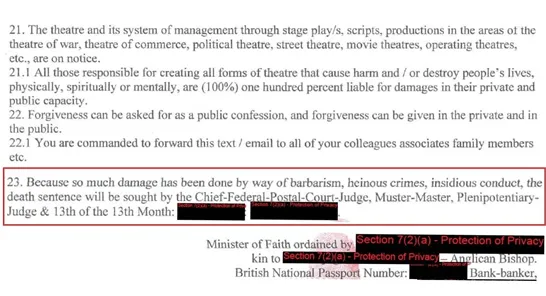
What can the Police and Councils do?
The courts usually end up dealing with the more extreme cases. In terms of managing them on the frontline, the Police generally advise going the ‘low drama, low attention’ route and trying to minimise the attention they get, as well as the ensuing disruption to others, as much as possible. While many who identify as a sovereign citizen are not a danger, the Police know to be cautious in their interactions with them.
Police and Council officers also take precautions to keep themselves safe, including locking down social media, going on the unpublished electoral roll, and asking their local Council to go on the Confidential Rating Information database (RID). Good tips for anyone working in a safety-sensitive role like this.
More broadly, there are the Combined Threat Assessment Group (CTAG) and police’s Security Intelligence and Threats Group, who keep an eye on activities as well as some individuals.
In terms of the LGOIMA abuse, like with the Official Information Act requests for information can be declined if they are frivolous or vexatious. But obviously they can’t ignore any meritorious requests caught up in the mix.
Well, that’s all I have space for today. I had hoped to find something I could write a quick article on, and this topic was not that! It just keeps on giving. In the next parts of my series I will be going into the sorts of things hitting Justices of the Peace (JPs), and getting into more of the Court dramas, including quotes from some very long-suffering judges - so stay tuned!